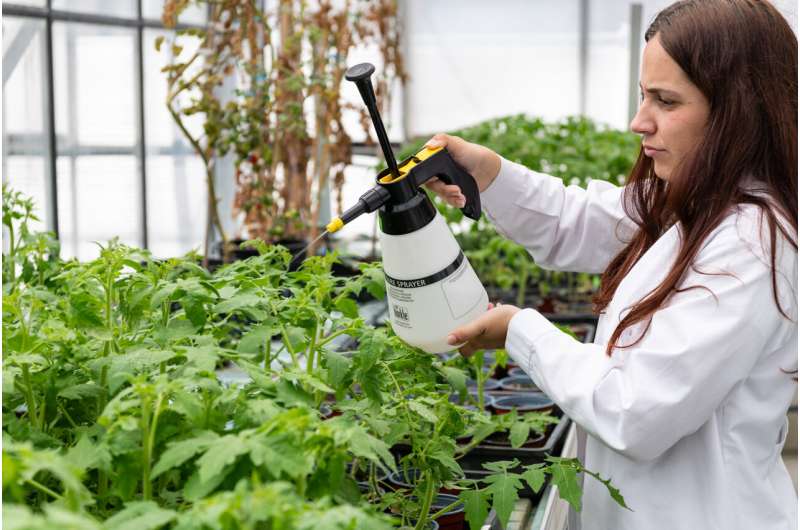This article has been reviewed according to Science X's editorial process and policies. Editors have highlighted the following attributes while ensuring the content's credibility:
fact-checked
trusted source
proofread
The aroma of tomato resistance—discovery of a new compound to protect from bacteria and drought

In a recent study published on the cover of the Plant Physiology journal, the IBMCP team has identified a new volatile compound—alpha-terpineol—that effectively protects plants from Pseudomonas syringae. This pathogenic bacterium causes severe damage to various crops. This finding could improve crop protection treatments by providing natural and highly effective plant protection.
Julia Pérez-Pérez, a Ph.D. student at the UPV and co-author of the study, explains that, as in human interaction, plants have their own way of communication and defense. "They emit volatile compounds to alert their neighbors to danger and use their sense of smell to perceive the message," says Pérez-Pérez.
To illustrate, Pérez-Pérez adds, "Imagine a field of tomatoes where the bacteria penetrate the leaves of a plant through the stomata. As it spreads, the plant defends itself from attack by releasing volatiles such as terpene. Other parts of the plant itself and neighboring plants 'smell' this chemical message and quickly close their stomata, preventing the entry of the pathogen and thus protecting the crop."
The same IBMCP team has already patented and licensed another volatile compound, HB, which also protects plants, with the company Meristem. Now, with the discovery of terpineol, they have a new method to strengthen the resistance of the crops.
"Both compounds are part of what we call the aroma of resistance, which symbolizes the smell of survival for tomato plants," Pérez-Pérez adds.
It is a very simple, cheap and environmentally friendly application
According to the IBMCP team, applying terpineol and HB would be very straightforward and versatile: they can be sprayed directly on the plants or applied by diffuser devices. In fact, through a project conducted in collaboration with the company Meristem, they are exploring possible synergies between these and other volatile compounds to activate the defensive response of plants efficiently and very cheaply.
"The use of these compounds offers the agricultural sector a new economic, fast and highly effective alternative to improve the yield of such an important crop as tomato," adds Purificación Lisón, IBMCP researcher and lecturer in the Biotechnology Department of the School of Agricultural Engineering and Environment (ETSIAMN) and co-author of the study.
In addition, applying these compounds in agricultural treatments would also reduce the use of chemical compounds. "This is not only beneficial for the environment but also promotes more sustainable agriculture," adds María Pilar López Gresa, an IBMCP researcher and senior lecturer at ETSIAMN.
And also, against the drought
According to the researchers, this natural strategy could serve as a protective barrier against bacteria and other infections and even protect plants from the effects of drought.
"This IBMCP discovery represents a significant breakthrough in crop protection, offering a natural, effective and environmentally friendly solution to today's agricultural challenges," conclude the IBMCP researchers.
More information: Julia Pérez-Pérez et al, Metabolic crosstalk between hydroxylated monoterpenes and salicylic acid in tomato defense response against bacteria, Plant Physiology (2024). DOI: 10.1093/plphys/kiae148
Provided by Technical University of Valencia





















